Glorious history, prestigious artists and painters, romantic French kisses, dazzling fashion elements…… These are the descriptions that may jump into your mind when reflecting on France, which has long been a global center of art, science and philosophy.
However, you may also recall the 2015 terrorist attack happened in Charlie Hebdo, the gunshot event in Strasburg Christmas market not long before, or the long-lasting “yellow-vest protest” throughout the whole country. While France is more or less a far-away symbol for most Chinese, Wuhan University has a long-lasting cooperation with French universities that can be traced back to the early 21st century, sending students from various majors and grades to different parts of France for exchange while accepting many French students on our campus.
Here we interview several Chinese exchange students in France and share our true French life with you.
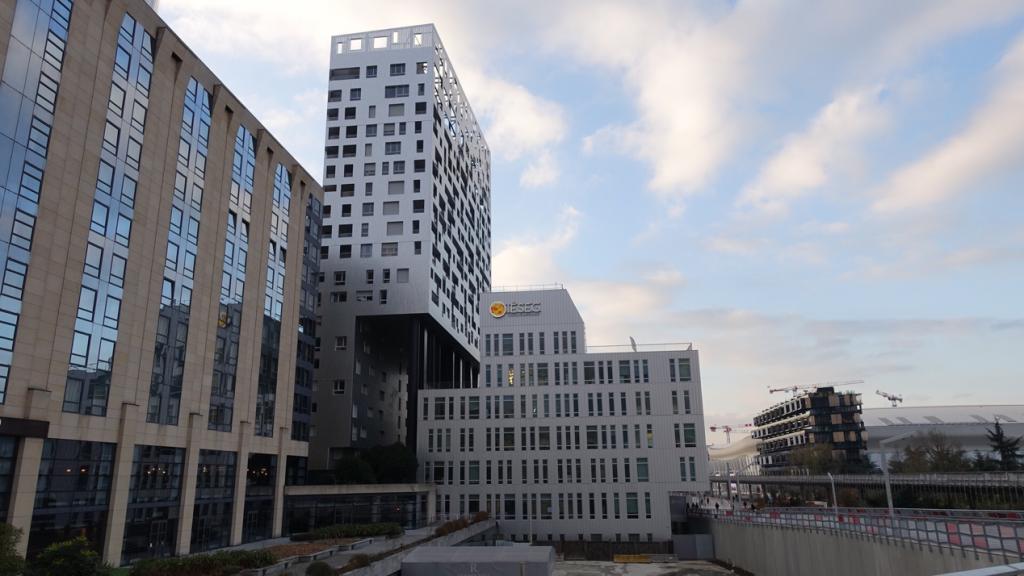
IESEG School of Management, Paris
The largest obstacle: language
When asked about the greatest challenge or obstacle they encounter in France, these students of different majors and French levels provide us with exactly the same answer: language barrier.
“French people don’t like to speak English,” says Hong Jiangpeng, exchange student in Toulouse Business School majoring in Personal Resource Management, “and if you can speak French, they will be more willing to offer help.”
“In Paris, it is not that hard to get around shops and survive with English, especially when your campus locates in the financial center of the city.” Zhang Pei, my schoolmate in Paris campus of IESEG School of Management majoring in Marketing, who had never learned French before arriving there, shares his own experience. “However, it can be incredibly inconvenient when it comes to communication with the administration or deliveryman.” And that’s absolutely true, bringing me back to the desperate feeling I had when answering the phone call of the French-speaking deliveryman because we could not understand each other.

La Grande Arche, Paris
Liu Shuting, exchange student in Nancy for Clinical Medicine internship, addresses the importance of French learning: “Back in WHU, I was in a collaborative program and had learned French for over 2 years. I passed the DELF B2 French level exam, but still it is not enough. Living and communicating with French patients are quite different from learning French in China. The language barrier is still so visible for me when the patients speak really fast.”
“However, if you compare France with China, you will find the language barrier reasonable and tolerable.” Li Chonglin, exchange student in Lille campus of IESEG School of Management treats this problem in a different perspective, “In China not all the administrative staff can speak fluent English either, so we just have to be positive and try to get use to it, and work harder on learning French.”
Difference in Academic Life
Educational system in French is quite different from that in China.
“In our school we have three short periods in one school semester. In the first period we take core classes and in the following two we take more specialized classes such as pre-orientation management (POM) classes. Hong Jiangpeng tells us the arrangement of his school, “The biggest difference for me is that they barely have lunch time. We even have classes between 11am to 2pm.”
It is very true. Having a sandwich for a quick lunch while doing group discussion is also a common scene in IESEG School of Management: “Here we have two kinds of classes: intensive classes and extensive classes, with the former lasting for a week from 8 a.m. to 12:20 p.m. while the latter normally extending for the whole semester. This arrangement makes students fully occupied because the class in the afternoon begins at 13:10 p.m.” For exchange students the workload is not as heavy as that of full-time students here, who lead a life similar to high-school students’ in China.
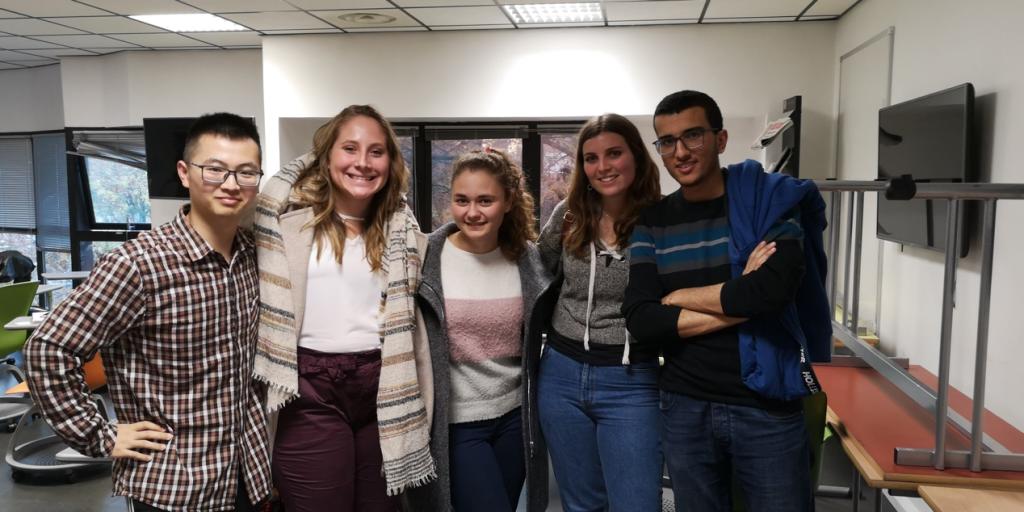
Hong Jiangpeng (leftmost) with his classmates, Toulouse
In terms of the content of education, our interviewees mention about the practical characteristic of teaching here coincidentally. “Back in WHU I have learned tons of theoretical knowledge and I found the courses here really good complements.” Zhang Pei and Hong Jiangpeng both express their admiration for practical case studies. “It is different from reading essays. Sometimes the case allocated by the professor can be really simple, yet it provokes our creativity and encourages us to solve a problem in real life.”
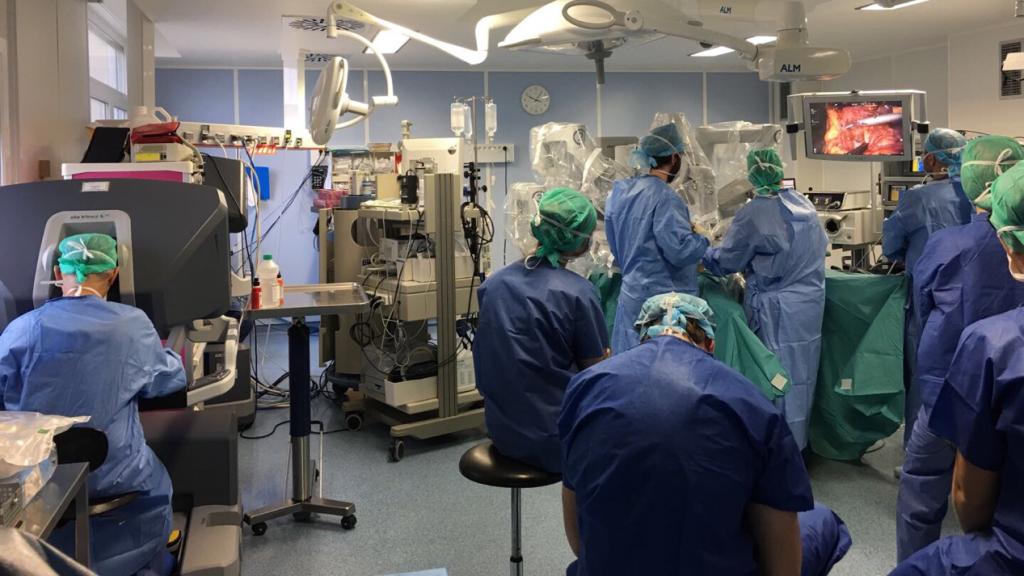
A surgery using Leonardo Da Vinci Surgical Robot, Nancy
Doing an internship in Centre Hospital University in Nancy, Liu Shuting shares her experience in French hospital with us. “The most impressing thing for me is to discover how sufficient their medical resources are and the light workload of doctors compared to that in China. Here you have to make an appointment with family doctor first and in hospital you see patients with really urgent need, who are wounded or bleeding. Besides, doctors have secretaries to do the recording tasks which saves their time for unnecessary work.” Also she mentions the social status of doctors in France: “Here doctors are highly respected and the medical environment is far better than that in China. We still have a long way to go.”
The Cultural Shock Thing
Complaining about the slow administration in France is a repertoire for every foreign residence here.
“Opening a bank account takes less than 5 minutes in China. But here you wait for the password sent through mail and some more mails for online services, which roughly takes a whole month.” And it is far from the only slow-pace experience Zhang Pei has, “when you apply for house subsidies and social insurance, you also have a tough month to wait for.”
Surely, getting used to French lifestyle needs time and open-mindedness. Li Chonglin expresses his opinion, “When we first come to a new country, it’s inevitable for us to continuously make comparisons. Everything here seems to remind us of the convenient and efficient lifestyle in China. However, after we try to understand the difference of the way French people think and handle things, we get to learn about their priorities for life. If you try to adapt to their tradition, all these inconveniences are not so difficult to accept. You just need to get used to it.”
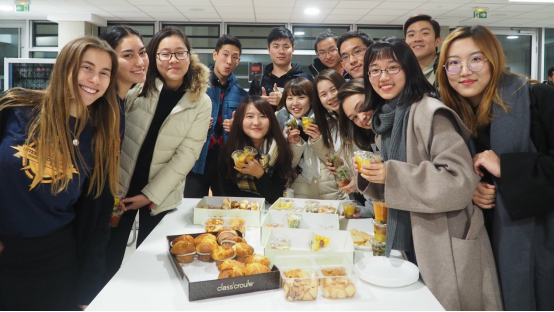
Farewell party in IESEG School of Management, Paris
Probably influenced by this kind of French lifestyle, our interviewees introspect into their inner self more and think about many aspects of life in a new horizon. “Back in China I was fully occupied by my courses and campus life, everything is scheduled that I feel like there is someone pushing me ahead.” Li Chonglin chooses the word “independent” to describe his life in Lille, “Here I arrange my time all by myself and I start to choose the kind of lifestyle I want. Gradually I begin to embrace the romanticism in France and under its social environment I discover myself more able to face failures.”
“I find that life here is kind of similar to that when you first begin to work, where you rent a small apartment and try to take care of all aspects of your life.” Both Zhang Pei and Hong Jiangpeng share this feeling, “In WHU we have roommates and we are always connected with someone else to share our life, which means one is easy to get influenced by the surroundings. However, here you’re responsible for your own life and I spend more time developing my own interests under this less competitive environment.”
The process of understanding and adapting to foreign culture is always the most charming part of exchange experience. It provides you with a chance to learn about the mechanisms of a different society. “I found French people stubborn sometimes,” Li Chonglin comments on the long-lasting “Yellow-velt” manifestation, “they impress their anger and request and insist unless they’re satisfied. And it is understandable if you look back into the revolutionary history in France.”
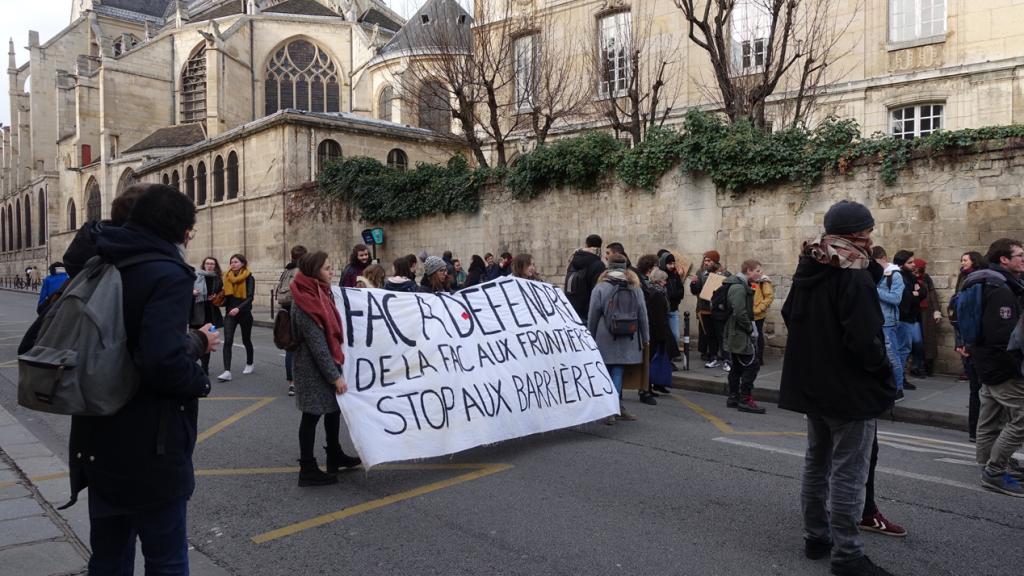
Students’ manifestation against change in educational policies, Paris
Being an exchange student does not only indicate endeavors to adapt to foreign culture and society, but also provide one with unique chances to perform the traits of his or her own culture. Living in a foreign country, one is always the representative of his country and culture. WHU students are always willing to spread Chinese culture around the world and try to make the rest of the world know China better. “I had a Global Online Retail course this semester where I was deeply impressed because the professor spent the majority of the class telling about Chinese retailing history and its development over the years.” Zhang Pei regards it as the most impressive experience he had in IESEG, “I am really proud to see the progress we have made and willing to devote myself to communicating with people here and making effort to eliminate their prejudice on China.”
That is almost the best part of this foreign experience. The exchange life turns out to be a bilateral exchange in foreign cultures that encourages us to embrace the differences and change our perspective of thinking, leading to better understanding and broader horizon. It brings us long-lasting influences that are beneficial through the lifetime.
Original Article From: https://en.whu.edu.cn/list.jsp?urltype=tree.TreeTempUrl&wbtreeid=1050
Learn More and Apply: Wuhan University




















